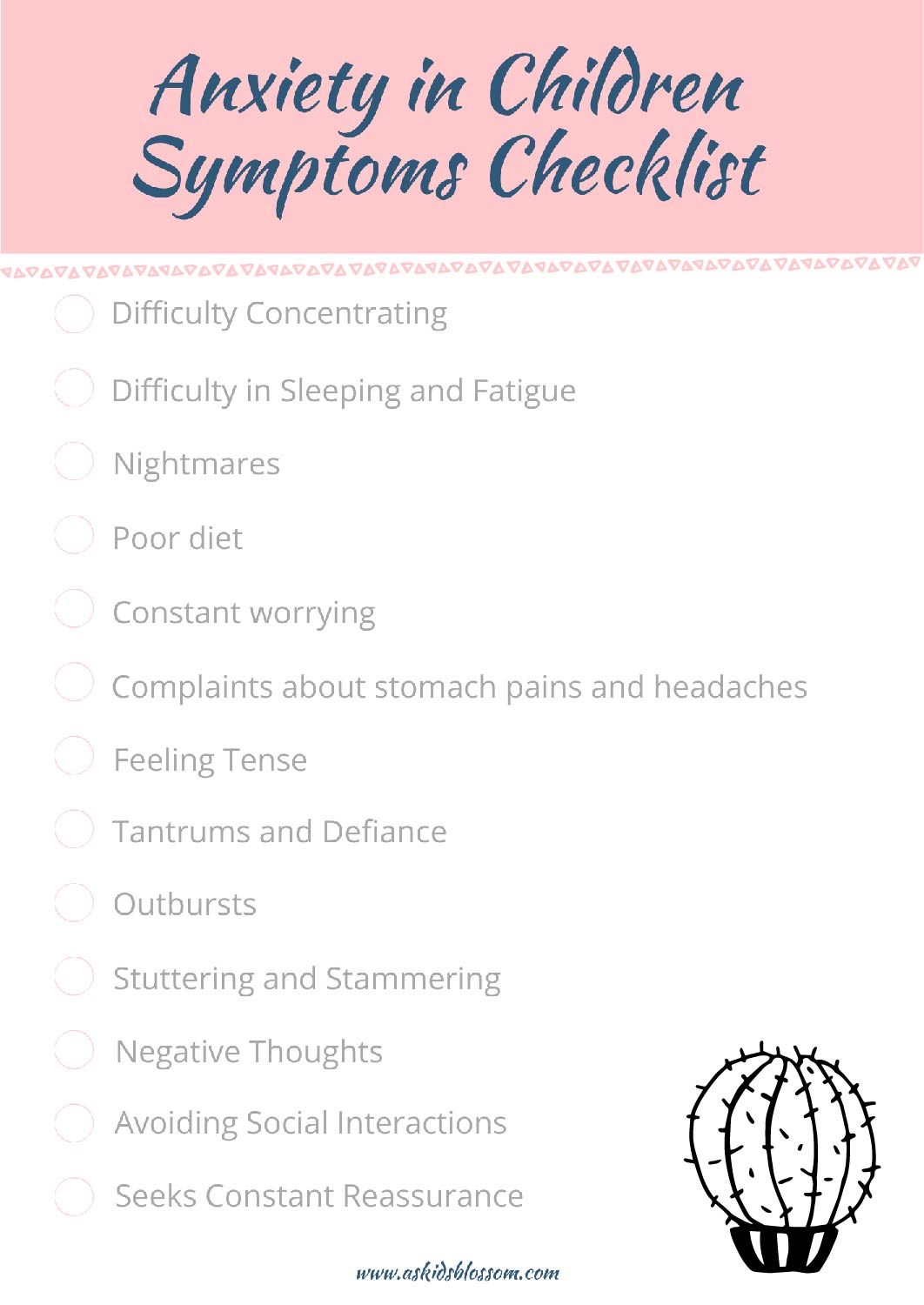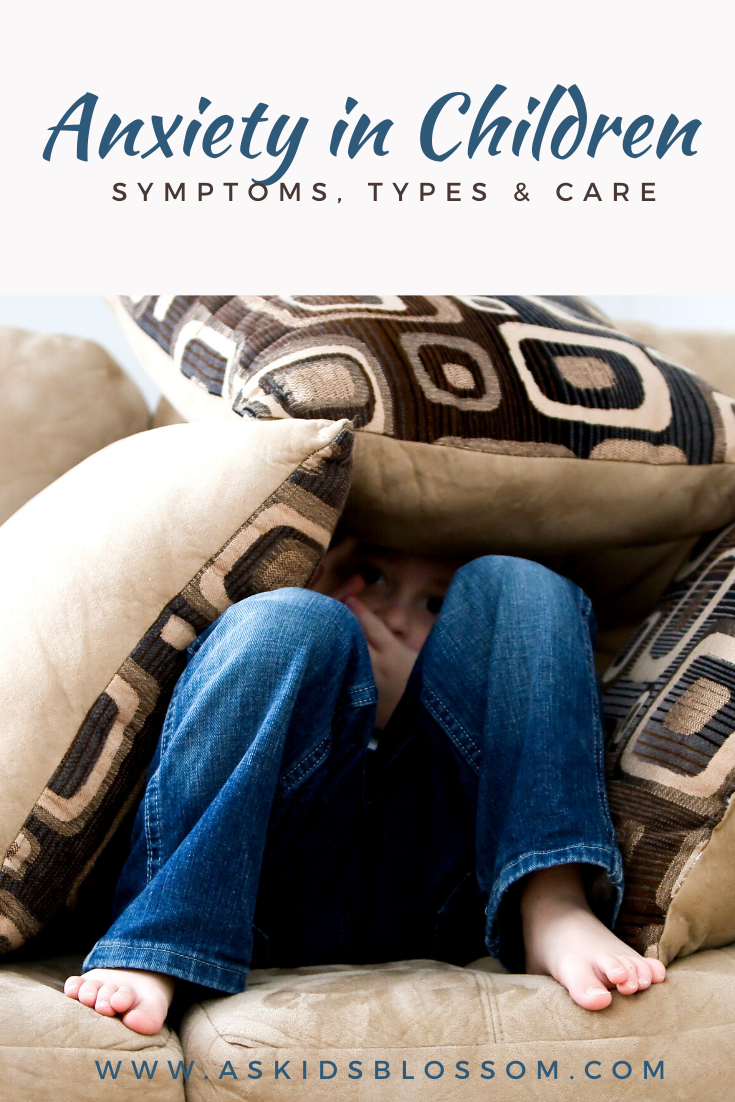Anxiety is one of the most common health issues prevailing in the United States. Around 18% of the population suffers from anxiety every year. And this includes our children. Anxiety in children is often an ignored topic because often times it does not manifest itself in the way it does with adults.
Types of Anxiety in Children
Some of the more common anxiety disorder in children are:
Generalized Anxiety Disorder
Generalized Anxiety Disorder (GAD) is a disorder where your child might worry about normal, everyday things like health, school, family or home. They see an exaggerated, unrealistic overview of the situation.
Separation Anxiety Disorder
Children are naturally attached to their primary caregivers. It is normal and even expected for a baby or toddler to be apprehensive when separated from their parents. For a school-going child to experience separation anxiety on the same level as a toddler can be a cause of concern. Especially if the child has nightmares, or constantly worries of being separated from his loved ones.
Selective Mutism
In some cases, we see children refusing to speak at all in the presence of outsiders. These kids are often very talkative at home, but once they enter a new environment or meet a new person, they avoid eye contact and don’t prefer to be engaged in any form of social contact.
Social Anxiety Disorder
Social Anxiety Disorder is where your child might be extremely uncomfortable in social situations. He avoids interacting with his peers in school or outside. His intense fear of social interaction makes it difficult for him to make friends or participate in discussions.
Specific Phobia
I personally know a child who has a phobia towards fruits! When he sees someone having fruit, he experiences mild anxiety where he clings to his parents, starts crying or starts making strange sounds. Some kids experience phobia to different objects like animals, dark and enclosed spaces, loud noises, etc.
Symptoms of Anxiety in Children
Many of you reading the above might be worrying about your child suffering from anxiety. I’d tell you that first, anxiety is one of the most treatable mental conditions. The first thing you should be doing is figuring out whether your child needs help. He might if he is exhibiting the following symptoms:
- Difficulty Concentrating
- Difficulty in Sleeping and Fatigue
- Nightmares
- Poor diet
- Constant worrying
- Seeks Reassurance
- Constant complaining about stomach pains and headaches
- Feeling Tense
- Tantrums and Defiance
- Outbursts
- Stuttering and Stammering
- Negative Thoughts
- Avoiding Social Interactions
Anxiety in Children Symptoms Checklist
To help you out, I have created this simple anxiety in children symptoms checklist to figure out whether you need to see a doctor for your child. Copy and print this checklist to discuss with your partner:

Dealing with Anxiety in Children
If you observe your child exhibiting more than 5 of the above symptoms, you might want to consult with a child psychologist. Apart from that, these coping strategies will definitely help:
Practice Calm
I want the parents to do this. Our children are very connected to us and our emotional turmoil often rubs off on them. Are you yourself feeling anxious? Or is your partner?
If you are experiencing panic attacks, talk to a therapist. And even if you are not, and still constantly worry about it, then practice deep breathing whenever you feel overwhelmed. Don’t hide your emotions from your child, but let them see more happiness than worry.
Be Present
Offer your child lots of hugs and kisses throughout the day. Research suggests that hugging and kissing bring out your happiness hormones. These are your best warriors to fight anxiety.
Along with that, talk to your child. Ask them about their worries and try to help them navigate through those worries by painting a positive picture. Give them reassurance.
Develop a Coping Mechanism
A coping mechanism is your action plan every time your child feels anxiety. A few helpful strategies are:
- Deep breathing. Practice it with your child.
- Give them a task. Opt for something they enjoy doing like cooking, painting, drawing, dancing or practicing a musical instrument.
- Go for a walk. Or maybe even try yoga for kids.
- Take time out
Respect Your Child’s Feeling
A child’s emotional self is still in it’s developing phases. He doesn’t have the big picture you have, so respect his feeling. If he is feeling overwhelmed, acknowledge that and offer them a comforting and calm space to express his feeling. Never belittle your child’s feelings and perspective.
Don’t Avoid Social Interaction
If your child begs you not to send him to class on presentation days, don’t give in. Be firm and polite while you explain why he has to go. Talk to him about his worries. Revisit the coping mechanism with him. Discuss strategies on how he can deal with that situation. Talk about your own experiences.
Encourage and Appreciate
With these strategies, your child might slowly start moving towards a less worrisome and more happier place. Encourage and appreciate that change, even it is a very slow one. Celebrate small victories. When a parent believes in the child, the child’s belief in himself grows exponentially and so does his confidence and self-esteem.
I hope that you try out some of these activities to help deal with anxiety in children! If you do, please share what you did in our FREE Facebook community! It’s a fun community of parents where we celebrate successes, look for support, and share in the parenting journey.
As always, if you have concerns about your child’s development and would like to set up a free consultation to discuss your concerns, please reach out!
I would love to help you determine your child’s individual needs. We are here to support you as you help your child blossom!
If you found Anxiety in Children: Symptoms, Types and Care a useful read, you might also want to read:
Postpartum Depression: Early Help Protects Both You and Your Baby
Promoting Your Baby’s Social-Emotional Development
